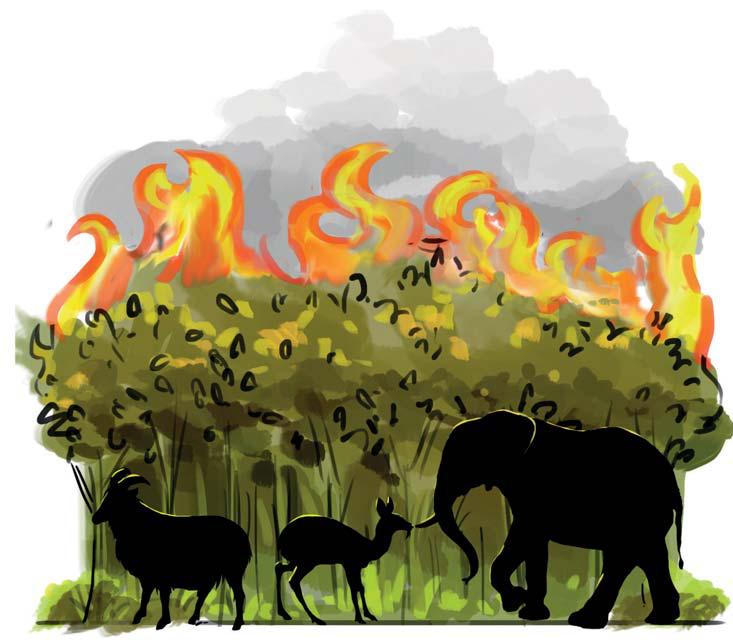Prøve GULL - Gratis
Fatal coincidence
Down To Earth
|April 16, 2023
Forest fire season in Uttarakhand coincides with flowering and breeding months of several vulnerable species, many of them native to Himalayas

FOREST FIRES are becoming more frequent and fierce in Uttarakhand. Such regular burnings can be catastrophic for the state as well as the rich biodiversity it harbours. Uttarakhand is home to at least 102 species of mammals, 70 reptiles, 19 amphibians, and 124 species of fish. The state also boasts of 600 species of birds. The International Union for Conservation of Nature (IUCN) classifies 55 of the bird species as "threatened", of which six are critically endangered and four are endangered. Several mammalian fauna found in the state are also classified as endangered. The list includes the Asian elephant, tiger, Alpine musk deer, Himalayan musk deer, leopard, snow leopard, blue sheep, Himalayan Thar, leopard cat, Himalayan black bear, sloth bear and pangolin. With 7,000 species of plants, Uttarakhand contributes 31 per cent of the country's floral diversity. As many as 119 flowering plants are endemic to the state. The impact of recurrent forest fires in Uttarakhand is therefore not limited to the direct loss of trees and wildlife, their displacement and subsequent colonisation of unwanted species.
Forest fires can meddle with the life cycle of species and push many of the threatened and endemic species closer to extinction.
For instance, by destroying the leaves and foliage, a forest fire can significantly reduce the photosynthetic activity of surviving trees and thereby affect their growth. It can also damage the seed bank, both above and below the ground, and wipe out the seedlings and saplings growing on the forest floor. Species that are sparsely distributed and have small or patchy populations suffer the worst impacts as they lose their habitat, territories, shelter and food. The loss of keystone organisms in forest ecosystems, such as invertebrates, pollinators, and decomposers, can significantly slow the recovery rate of the forest.
Denne historien er fra April 16, 2023-utgaven av Down To Earth.
Abonner på Magzter GOLD for å få tilgang til tusenvis av kuraterte premiumhistorier og over 9000 magasiner og aviser.
Allerede abonnent? Logg på
FLERE HISTORIER FRA Down To Earth

Down To Earth
THINK TWICE BEFORE FELLING SAL TREES
Many trees considered to be affected by sal borer in the 1990s are still alive today
1 mins
February 16, 2026

Down To Earth
EDGE OF SURVIVAL
Caste divides deny marginalised communities land, resources and essential aid, leaving them more vulnerable to climate disasters
6 mins
February 16, 2026

Down To Earth
A WISH LIST?
Union Budget for 2026-27 conveys the impression of a roll-call of intentions and ambitious proposals, with little detail on their formulation
6 mins
February 16, 2026
Down To Earth
Break down the gender wall
THE RULING National Democratic Alliance (NDA) government has been heavily invested in the goal to make India a developed economy by 2047.
2 mins
February 16, 2026

Down To Earth
MENSTRUAL HEALTH, NOW A FUNDAMENTAL RIGHT
In a landmark judgement, the Supreme Court has recognised menstrual health and hygiene as a fundamental right under Article 21 of the Constitution of India, which guarantees the right to life and dignity.
8 mins
February 16, 2026

Down To Earth
Of devolution and new disasters
The 16th Finance Commission pushes for changes in view of new fiscal and climatic conditions
11 mins
February 16, 2026
Down To Earth
Rising risks of plastics
NEGATIVE IMPACTS on human health due to emissions linked to the plastic lifecycle could double by 2040, according to a study published in The Lancet Planetary Health in January.
1 min
February 16, 2026

Down To Earth
GAP BETWEEN EPIDEMICS NARROWING
A watershed-based and landscape-level approach is needed to address forest degradation
2 mins
February 16, 2026

Down To Earth
WAITING TO STRIKE
Sal heartwood borer is considered the biggest threat to forestry in India, especially to the sal tree, where it lives and breeds.
11 mins
February 16, 2026

Down To Earth
A SPRING DELIGHT
Mustard flowers are not meant only for the eyes. Invite them to your plate once in a while
3 mins
February 16, 2026
Translate
Change font size

